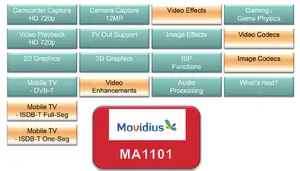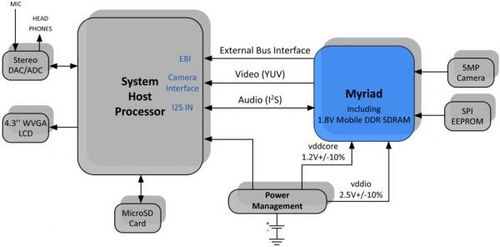(→Overview) |
|||
| Line 30: | Line 30: | ||
== Overview == | == Overview == | ||
| + | [[File:ma1101 multimedia.png|right|thumb|Multimedia]] | ||
The MA1101 is a vision [[accelerator]] designed to work alongside a main host processors, typically in a mobile or embedded device. The chip itself independently communicates with the camera input and does the processing internally. | The MA1101 is a vision [[accelerator]] designed to work alongside a main host processors, typically in a mobile or embedded device. The chip itself independently communicates with the camera input and does the processing internally. | ||
Revision as of 15:17, 11 March 2018
| Edit Values | |
| Myriad 1 MA1101 | |
| General Info | |
| Designer | Movidius |
| Manufacturer | TSMC |
| Model Number | MA1101 |
| Market | Embedded, Mobile |
| Introduction | 2009 (announced) 2009 (launched) |
| General Specs | |
| Family | Myriad |
| Series | 1 |
| Frequency | 180 MHz |
| Microarchitecture | |
| ISA | SPARC V8 (SPARC), SHAVE (SHAVE) |
| Microarchitecture | LEON3, SHAVE v2.0 |
| Process | 65 nm |
| Technology | TSMC |
| Word Size | 32 bit |
| Cores | 9 |
| Threads | 9 |
| Electrical | |
| Vcore | 1.2 V |
| VI/O | 2.5 V |
Myriad 1 MA1101 was a vision processing accelerator designed by Movidius and introduced in 2009 designed to serve as an advanced real-time video editing accelerator for smartphones. The MA1101 is an identical variant of the MA1100 but had added compatibility for Android OS.
Overview
The MA1101 is a vision accelerator designed to work alongside a main host processors, typically in a mobile or embedded device. The chip itself independently communicates with the camera input and does the processing internally.
The MA1101 consists of a single SPARC V8 LEON3 core which is used for management and control and eight SHAVE v2.0 core which are the workhorse of this chip. Each core has 128 KiB of cache. The eight SHAVE cores together are capable of 20GFLOPS of processing power at just a few 100s milliwatt of power.
Video Decoding
| Hardware Accelerated Video Capabilities | ||
|---|---|---|
| Codec | Profiles | Resolutions |
| MPEG-2 (H.262) | Main | 1920x1080 interlaced, up to 15 Mbits/s |
| MPEG-4 AVC (H.264) | Baseline | (QVGA) 320x240 |
- Aspect Ratio: 4:3 or 16:9
- Video Enhancements
- High Quality Upsampling: Up to WVGA (480x854) and XGA (1024x768)
- High Quality Downsampling: Up to WVGA (480x854) and XGA (1024x768)
- Frame rate enhancement: from 15fps to 30fps
Extensions
- Host Memory Bus (master and slave): 8-bit / 16-bit / 32-bit
- Video Output Formats:
- 8-24 bit RGB, CPU (Intel/Motorola), BT656 ...
- 24bpp, 16M colors, resolutions up to 2048x2048
- Video support for 4 layers of video and graphics
- External TV Support
- Video Output to External HDMI Driver Chip
- Multiple I2S (Master/Slave) stereo audio channels
- Independent sampling frequencies
- Standard interfaces
- I2C, UART, SDIO, SPI
- Configurable bidirectional GPIO lanes
| base frequency | 180 MHz (0.18 GHz, 180,000 kHz) + |
| core count | 9 + |
| core voltage | 1.2 V (12 dV, 120 cV, 1,200 mV) + |
| designer | Movidius + |
| family | Myriad + |
| first announced | 2009 + |
| first launched | 2009 + |
| full page name | movidius/myriad/ma1101 + |
| instance of | microprocessor + |
| io voltage | 2.5 V (25 dV, 250 cV, 2,500 mV) + |
| isa | SPARC V8 + and SHAVE + |
| isa family | SPARC + and SHAVE + |
| ldate | 2009 + |
| manufacturer | TSMC + |
| market segment | Embedded + and Mobile + |
| microarchitecture | LEON3 + and SHAVE v2.0 + |
| model number | MA1101 + |
| name | Myriad 1 MA1101 + |
| process | 65 nm (0.065 μm, 6.5e-5 mm) + |
| series | 1 + |
| thread count | 9 + |
| word size | 32 bit (4 octets, 8 nibbles) + |

